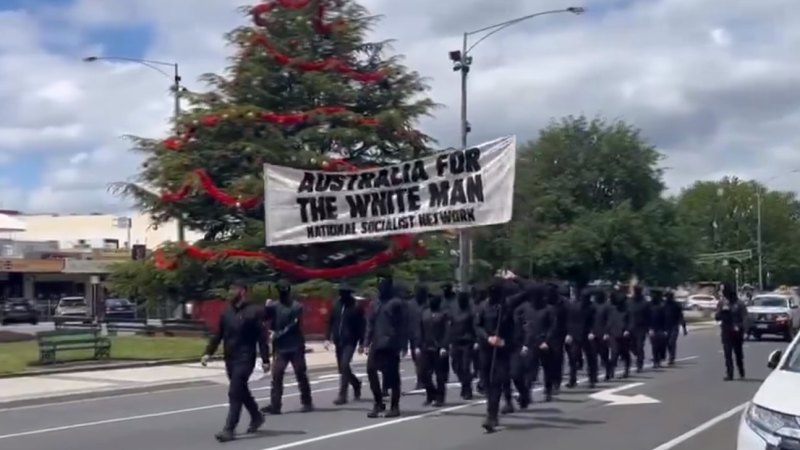Save articles for later
Add articles to your saved list and come back to them any time.
Tougher anti-vilification laws will not be brought before the Victorian Parliament until the second half of next year as the state grapples with another neo-Nazi demonstration.
Premier Jacinta Allan condemned the second action from far-right extremists in seven weeks, while the police association and the state opposition called on her government to help police take tougher action.
Police Association of Victoria secretary Wayne Gatt told The Age the Ballarat incident on Sunday and another in October, when a group of neo-Nazis stormed a train at Flinders Street, highlighted the tough position facing police members.
“In situations like this, police find themselves caught between a rock and a hard place,” Gatt said. “If something is not illegal, police cannot act. It is up to the government to set expectations of what is legally acceptable behaviour and how it wants police to deal with it.
“Relying on minor summary offences, unrelated to the conduct in question, is a workaround, but not a solution.”
Opposition Leader John Pesutto said the Liberal Party’s proposal to expand “move on” powers would give police more options to respond and could defuse situations.
“We want laws changed so that Victoria Police have more powers at their discretion so that they can deal with potentially difficult situations without the binary choice of doing nothing or arresting people,” Pesutto said.
The government objected to the opposition’s “draconian” proposal last month, which Attorney-General Jaclyn Symes at the time said had been misused in the past.
A government spokeswoman said police still had the power to move people on if they posed a danger.
“Victoria Police have plenty of powers to respond to events that threaten public safety and order, including existing move-on laws and the ability to declare designated areas where police can search people without a warrant,” she said.
A neo-Nazi group made an unannounced walk through Ballarat on Sunday.Credit: Twitter
Shadow attorney-general Michael O’Brien told The Age the opposition would reintroduce the bill to the upper house next year.
About 30 people from the National Socialist Network marched through Ballarat on Sunday afternoon with their faces covered while chanting, “Australia for the white man” and “hail victory”, which translates to the Nazi Party slogan “sieg heil” in German.
Victoria Police confirmed it was investigating whether someone performed a Nazi salute, which was outlawed in October, following an earlier ban on public displays of the swastika.
Police said its priority was keeping the peace to ensure the event did not become a danger to the broader community.
Allan condemned what she described as disgusting behaviour and said all Victorians deserved to live free from bigotry.
“These disgraceful and cowardly acts have no place in Victoria – that’s why we have banned the Nazi salute and stand ready to take further action to stamp out this disgusting behaviour,” Allan said
While a parliamentary inquiry 2½ years ago recommended tougher anti-vilification laws, the government does not expect to bring the bill to parliament until the second half of 2024 after beginning consultations this year.
“Consultation is still underway to strengthen and expand our anti-vilification laws. These laws are incredibly complex – the last thing we want is for any changes to inadvertently end up working against the people we’re trying to protect,” a government spokeswoman said.
“They must be carefully balanced between protecting communities against hate speech and respecting people’s right to freedom of speech.”
The inquiry recommended lowering the threshold of offences so that a person could be charged for either inciting hatred or threatening physical harm. As it stands, vilification offences state a person needs to be accused of both.
It also recommended including recklessness, instead of requiring proof that a person intended to do something that they knew would likely incite hatred, serious contempt, revulsion, or serious ridicule and was likely to threaten harm.
“This is an extremely high and narrow threshold,” consultation papers from the Department of Justice and Community Safety said. The proposed reforms would “streamline and improve the current offences, which [the inquiry] found to be too complex and difficult to prove”.
The requirement to obtain written approval from the Director of Public Prosecutions before a person could be charged with a serious vilification offence could also be removed after the inquiry heard it was inefficient and an unnecessary barrier for police.
Victorian Equal Opportunity and Human Rights Commissioner Ro Allen said the state’s existing law was underutilised in practise and the current work to improve it was a critical opportunity.
“There are some significant barriers to the current law’s use, including legal tests for vilification that are too high and too difficult to navigate,” Allen said in a statement.
Deputy Liberal leader David Southwick, the local member for Caulfield, said Sunday’s demonstration was clearly incitement and the government needed to give a clear signal there would be consequences to stop more hateful events.
“What is the government waiting for?”
Greens leader Samantha Ratnam said the far-right extremists were an increasing threat to Victoria and called on the government to act with urgency on recommendations from a parliamentary inquiry on extremism.
Executive Council of Australian Jewry co-chief executive Alex Ryvchin said the best defence in response to white nationalism was education and leadership.
“We will never defeat extremism entirely, but we can inoculate wider society from the conspiracy theories and paranoia in which hatred thrives.”
Get the day’s breaking news, entertainment ideas and a long read to enjoy. Sign up to receive our Evening Edition newsletter.
Most Viewed in National
From our partners
Source: Read Full Article

